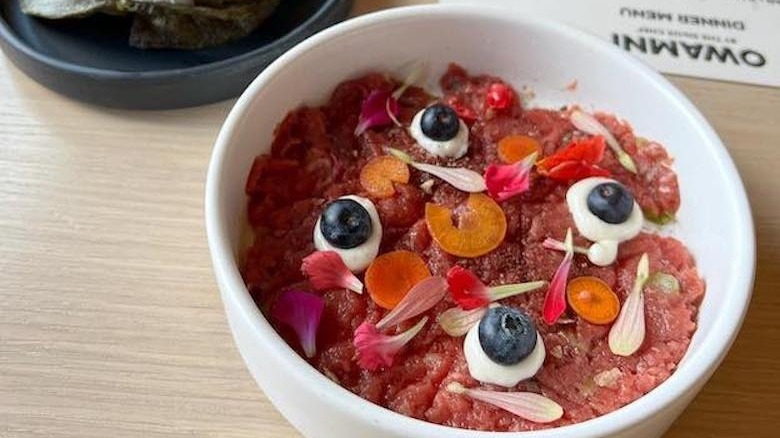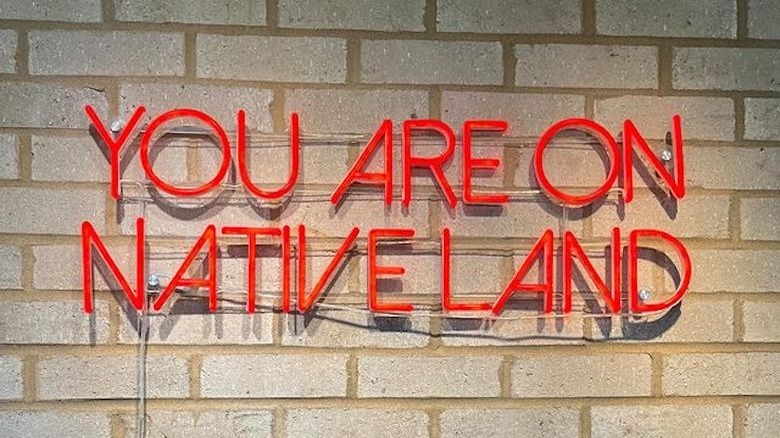The Award-Winning Minneapolis Restaurant That's Been 'Decolonized'
Owamni by the Sioux Chef, a restaurant in Minneapolis, Minnesota, goes far beyond having award-winning food. However, they did win 2022's James Beard award for Best New Restaurant (via Sioux Falls Business). Owamni is not a relic of foods and practices of some bygone past — it is very much a live reflection of indigeneity. The Minneapolis chef revitalizing Native American cuisine, Sean Sherman, also known as the Sioux Chef, and co-founder Dana Thompson take a "decolonized approach," avoiding "dairy, wheat flour, cane sugar, beef, chicken, and pork" on their menu, per NPR.
Instead, Owamni focuses on fresh and local ingredients that grew in this region long before European colonization and prioritizes sourcing from indigenous growers. Sherman explains to NPR, "We're trying to evolve the food into the future, using as much of the knowledge from our ancestors that we can understand and just applying it to the modern world."
Indigenous culture guides Owamni
The name Owamni comes from the Dakota name Owamniyomni meaning "falling, swirling water," which is also the Dakota village that existed in the exact location of the restaurant. Colonists called it St. Anthony Falls, notes The New Yorker. Beyond the food and the name, Owamni weaves the culture into all aspects of the dining experience. Around 75% of the staff identify as Native (via MSP Mag), the menu includes Dakota words before their English translations, and a sign at the entrance acts as a reminder reading "You Are On Native Land." The New Yorker describes how staff can even be spotted wearing shirts with the phrase "#86colonialism", which is restaurant vernacular for when an item is sold out. "We are putting culture on the table and we are putting our stories on the table. White supremacy does not like being dismantled, but we can do it together," Sean Sherman tells MSP Mag.
Owamni creates dishes like cedar braised bison with maple vinegar, game tartare with duck egg aioli and sumac, and desserts like wild rice sorbet. Choose a locally brewed beer, a wine from the Americas, or Zhoominabo, vermouths made with ingredients like sarsaparilla, linden flower, and rose hips. The zero-proof options at Owamni are not to be missed, either. Along with many tea blends, they also have mocktails like the Gaagaagiwaandagomin, a juniper berry libation accompanied by blueberry and bay leaf, or switchel, a fizzy, honey-sweetened, apple cider vinegar beverage.
Owamni is one of many projects of the Sioux Chef
The Sioux Chef is a team of people passionate about the longevity of Native American cuisine, a food tradition that has historically been undervalued and overlooked (via The Sioux Chef). North American Traditional Indigenous Food Systems, or NATIFS, and The Indigenous Food Lab fall under the nonprofit arm of the Sioux Chef. NATIFS broadly addresses "the economic and health crises affecting Native communities by re-establishing Native foodways," while The Indigenous Food Lab supports Native people in the food industry. Sean Sherman, alongside Beth Dooley, wrote the cookbook "The Sioux Chef's Indigenous Kitchen," which won the 2018 James Beard Award for Best American Cookbook.
Given this intentionality, it is no wonder Owamni strikes a chord, but the restaurant is just one representation of a myriad of cultures. The U.S. Government Accountability Office recognizes 574 tribes in just the United States. For Sherman, the next steps are clear. In an interview with NPR, he says, "We should have Native restaurants in every single city to showcase the amazing cultures that are all over the place and the resiliency of Indigenous peoples that are still thriving here today everywhere."


